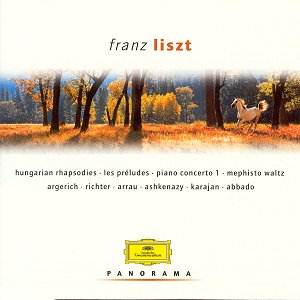FRANZ LISZT
Symphonic Poem Les Preludes
Fantasia on Hungarian Folk Melodies
Hungarian Rhapsodies nos. 2 and 4. (Shura Cherkassky, BPO,
Karajan)
Piano Concerto no.1 (Argerich, LSO, Abbado)
Mephisto Waltz no. 1 (Richter)
Piano Sonata (Argerich)
Feux follets; Harmonies du soir. (Richter)
Benediction de Dieu dans la solitude (Arrau)
Hungarian Rhapsody (Argerich)
 DG Panorama 469 151 -2.
Two CDs series at a special price. (ADD) [75.52 and
75.23]
DG Panorama 469 151 -2.
Two CDs series at a special price. (ADD) [75.52 and
75.23]
Crotchet

Karajan fails to understand Liszt as is quite evident from his recording
of four works on this disc. To add to the problems, track 3 on the first
CD is not the Hungarian Rhapsody no. 2 as stated. Track 4 is the Hungarian
Rhapsody no. 2. But I should not worry about this too much. They are both
ill-served by the conductor.
The opening of Les Preludes has an inappropriate tempo and a lush
sound with an over-prominent harp: certainly not what Liszt required. The
music sounds like the watery music of Ravel or Debussy (not that there is
anything wrong with these two composers) but this is Liszt. The march section
is painfully slow and strident. The timpanist is in another building and
the performance is bland. Karajan drags the music so painfully at times it
is like pulling teeth and the result is that the music's excitement is lost.
Part of this splendid score was used in George Stevens' film The Greatest
Story Ever Told when the music was ascribed to Alfred Newman. The performance
used on that soundtrack is better than this. Even in the more energetic sections
Karajan fails to get the timpani entries to increase in tone at each entry.
The best recorded performance was on an old Supraphon disc with Martin Turnovsky
conducting.
For the musical detective can you hear a theme in the Liszt that Strauss
was to copy in Till Eulenspiegel?
Of course, there are composers that Karajan has had some success with but
even then he alters the composers' scores. For example he uses eight horns
in Beethoven's Choral Symphony ... not what Beethoven requested.
Shura Cherkassky tries, but fails, to get Karajan on line in the Fantasia
and you will see how he understands the music! My teacher (Humphrey
Searle - Ed) was the world's expert on Liszt and he hated Karajan's
performances. Having heard them for the first time I can see why.
Karajan's version of that Liszt evergreen, the Hungarian Rhapsody no. 2,
was crude and exaggerated and the Rhapsody no. 4 was no better. Listen to
the awful sounds of the horns at the beginning. Karajan shows no control
or understanding of the episodic nature of this work. He brings out sudden
surges of sound which are not in the score and makes the music sound banal.
I am reminded of that fine interpreter of Liszt, Louis Kentner, being asked
to record the Liszt concertos. "Certainly," he replied, "as long as Karajan
is not the conductor."
We now move to a different conductor. Abbado accompanies Martha Argerich
in the splendid Piano Concerto no. 1. The difference is evident. Here is
music for music's sake. This is a very difficult work to play and bring off
but it teems with ideas. Listen to how Abbado shapes the music. It is perfection
itself. Has simplicity ever sounded so moving? The drama is also very well
judged. The triumphant conclusion is majestic, without pomp. Argerich is
magnificent. Yes, her speeds are always slightly too fast but what a performance!
It is not favourite performance. André Watts with the New York PO
under Bernstein is even better than this noteworthy account!
The second disc is devoted to the piano and four pianists. Ashkenazy is
technically sound but I would have preferred a more diabolic sound for the
Mephisto Waltz. The Piano Sonata is, without doubt, the finest piano sonata
of all time. It is a monumental and thoroughly satisfying masterpiece. Argerich
is simply stunning, generating red hot excitement. Peter Katin's
performance on Athene is more mature
and he brings out the tender qualities better but if you just want the fireworks
and a breathtaking performance you will love Argerich. Richter's performances
left me cold. There was no subtlety or character in his performances. Arrau
is very fine in the massive Benediction although it is not the easiest of
pieces to take to. But what class playing! The indomitable Martha Argerich
ends the disc with the Hungarian Rhapsody no. 6.
I don't know how to assess these discs. What is clear is that you must look
elsewhere for the orchestral music since Karajan's performances are sabotage!
David Wright
Performances
Karajan... .appalling
Argerich 
Ashkenazy 
Arrau 
Richter 
Recording  to
to

